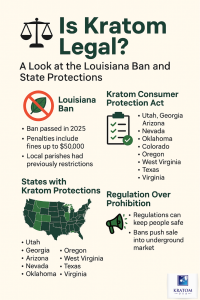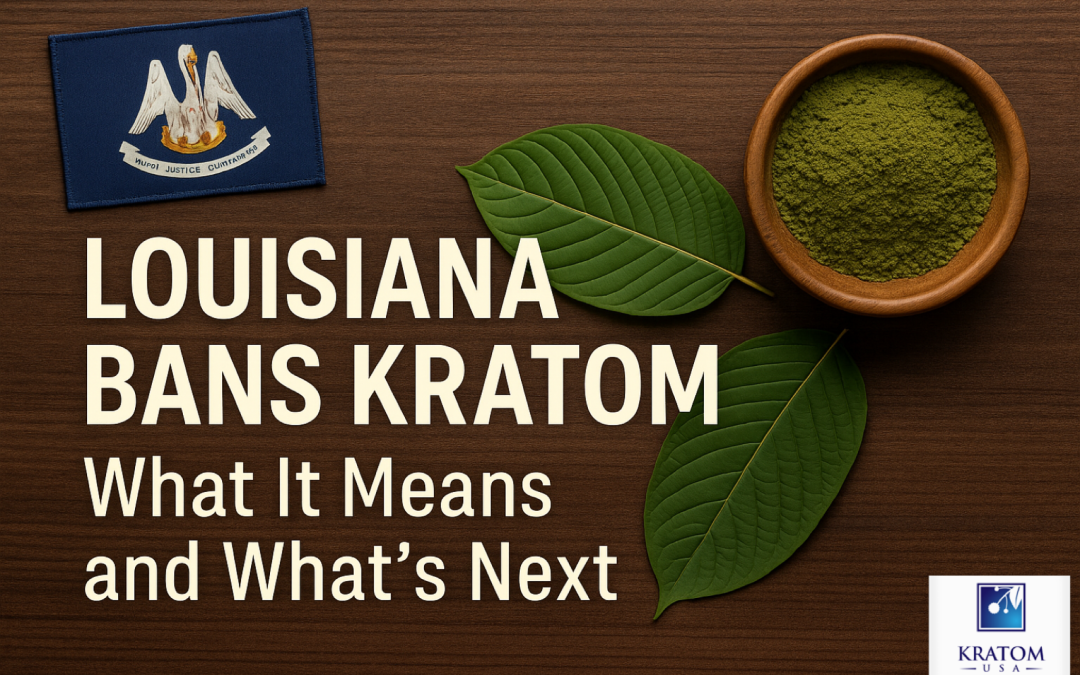⚖️ Kratom in Louisiana: A Look at the Louisiana Ban and What It Means for the U.S.
Exploring the Legal Status of Kratom, State Protections, and the Push for Regulation Over Prohibition
In recent years, kratom has gone from an obscure Southeast Asian herb to a nationally debated supplement in the U.S.—used by millions for natural pain relief, mood support, and energy. But despite its growing popularity and a growing body of research, kratom’s legal status continues to vary state by state.
The latest major development? Louisiana officially banned kratom in 2025, becoming one of a small but growing number of states to prohibit it. This decision has reignited nationwide discussion around kratom laws, safety, and the need for smart regulation—rather than criminalization.
This article breaks down the Louisiana kratom ban, where kratom is legal, and how the Kratom Consumer Protection Act (KCPA) is shaping the future of kratom access across the country.
📌 Key Points: Kratom’s Legal Status in the U.S.
-
🚫 Louisiana passed a statewide kratom ban in 2025, effective August 1
-
📜 Many states are protecting kratom legality by passing the Kratom Consumer Protection Act
-
🧪 Advocates urge regulation, not prohibition, citing research and public health
-
🌎 Kratom remains legal at the federal level, though local laws vary
-
⚖️ Several states and counties have kratom bans, but the trend is moving toward regulation and labeling standards
📍 Louisiana Bans Kratom Statewide: What You Need to Know
 On May 28, 2025, Louisiana Governor Jeff Landry signed SB 154 into law, making kratom illegal to sell, possess, or distribute statewide.
On May 28, 2025, Louisiana Governor Jeff Landry signed SB 154 into law, making kratom illegal to sell, possess, or distribute statewide.
Key Details:
-
⛔ Law criminalizes mitragynine and 7-hydroxymitragynine (kratom’s key alkaloids)
-
📆 Takes effect: August 1, 2025
-
💵 Penalties: Up to $50,000 in fines and possible imprisonment
-
📍 Local parishes like Tangipahoa, Ouachita, and LaSalle had previously banned kratom
While lawmakers cited safety concerns, critics—including the American Kratom Association (AKA)—argue that the ban ignores scientific evidence and may drive users toward more dangerous substances.
🛡️ What Is the Kratom Consumer Protection Act (KCPA)?
The Kratom Consumer Protection Act is a proposed state-level law that aims to regulate kratom, not ban it. Its goal is to ensure that kratom remains legal while protecting consumers through:
-
✅ Age restrictions (18+ or 21+)
-
✅ Product labeling standards
-
✅ Bans on adulterated or contaminated kratom
-
✅ Mandatory lab testing and quality assurance
-
✅ Vendor registration and oversight
🧬 The AKA and other advocacy groups support the KCPA as a science-based alternative to prohibition.
🗺️ States That Have Passed the Kratom Consumer Protection Act (as of 2025)
These states have adopted the KCPA or similar legislation, making kratom legal and regulated:
Utah
Georgia
Arizona
Nevada
Oklahoma
Colorado
Oregon
West Virginia
Texas
Virginia
Maryland
South Carolina
Kentucky
📌 KCPA Pending in:
-
Florida
-
Illinois
-
New York
-
Missouri
In states with the KCPA, kratom is treated like a regulated supplement—similar to CBD or caffeine—ensuring safety without criminalizing responsible use.
🧭 Where Else Is Kratom Banned in the U.S.?
As of 2025, kratom is banned in:
-
Alabama
-
Arkansas
-
Indiana
-
Wisconsin
-
Vermont
-
Rhode Island
-
Louisiana (effective August 2025)
Additionally, some cities and counties have local bans, even if the state permits it—such as:
-
San Diego, CA
-
Denver, CO (previously restricted but now under regulation)
-
Sarasota County, FL
🌿 Why Advocates Say Regulation Is Better Than Prohibition
Supporters of kratom argue that banning it entirely is both unscientific and unsafe. Here’s why:
-
📊 Over 16 million Americans have used kratom for wellness or to stop opioid use
-
🔬 Studies show kratom may support pain relief, anxiety reduction, and withdrawal management
-
⚠️ Bans push the market underground, increasing risk of contaminated or mislabeled products
Instead of prohibition, advocates call for quality control, education, and access to clean, lab-tested kratom.
✅ How to Use Kratom Responsibly Under Legal Frameworks
If you live in a state where kratom is legal:
-
📦 Buy only from lab-tested, transparent vendors
-
📜 Follow local labeling and age regulations
-
💊 Use moderate doses (2–4g) and rotate strains
-
👨⚕️ Talk to a doctor if you’re managing a health condition or on medication
Reputable vendors like Kratom USA offer high-quality, compliant kratom products with verified sourcing and same-day shipping.
❓ FAQ: Kratom Legality and the KCPA
Is kratom legal in the U.S.?
Yes, federally, kratom is legal—but several states and cities have their own restrictions or bans.
What is the Kratom Consumer Protection Act?
The KCPA is legislation that regulates kratom to ensure safety without banning it. It includes lab testing, labeling, and age restrictions.
Why did Louisiana ban kratom?
Lawmakers cited safety concerns, but advocates argue the ban lacks scientific support and will drive kratom use underground.
Which states have banned kratom?
As of 2025: Alabama, Arkansas, Indiana, Wisconsin, Rhode Island, Vermont, and Louisiana (starting August).
Can kratom still be purchased online?
Yes—but only if you’re in a legal state. Reputable vendors restrict shipping to banned areas.
🌿 Final Thoughts: Kratom’s Future Depends on Smart Regulation
The Louisiana kratom ban is a setback for advocates of natural wellness—but it also highlights the growing urgency for nationwide regulation and education.
Rather than criminalizing kratom users, many states are showing that consumer protection laws like the KCPA can keep people safe while preserving access to a plant that millions rely on for wellness, pain relief, and recovery.
To stay informed and take action, visit protectkratom.org, or explore lab-tested products at KratomUSA.com.



Kratom Advocate – My Story
Im a 62 yr old Female. Ive been fairly active most of my life. I do not take a lot of Rx Medications. You will understand why shortly. I used Kratom for many years before the ban. I did a lot of research before I used it the first time. Ive always ordered Natural Kratom from the same company. I’ve never purchased gas station product. My husband is 63 yrs old & disabled. He weights approximately 290 lbs. I weigh approximately 126 lbs. I am his sole caregiver….cook, nurse, driver, maid, personal hygiene assistant, etc…. I do everything they would do if he were in a hospital or rehab facility. It is a daily workout for someone thats as small as I am. He takes approximately 20-25 medications twice daily, along with 2 IV Antibiotics that I Infuse nightly. At one time he was a very successful Dirt Track Racecar Driver. He has a wall of Trophies & Awards. Now he can only sit in his recliner & look at them, unfortunately. Rx meds keep you alive, but at what cost? There’s no quality of life. I have seen, first hand, what side effects from Rx meds can do. Trying to talk to doctors about side effects only gets you more Rx meds to treat the side effects. This is why I choose to look for Natural or Herbal remedies for my health concerns. Natural Kratom gave me the help I needed to help my husband. Now I struggle daily. Im not a drug user & I never acquired a taste for alcohol. I do not have a criminal history/record or even traffic/parking tickets. That should prove I am a mature responsible adult capable of making my own health decisions. My right to make that decision was taken from me when Gov. Landry signed the Kratom Ban. I wasnt asked my opinion or even allowed to vote on it. I was dictated/told to stop or face criminal charges. How is that fair? Gov. Landry & other Louisiana Lawmakers know nothing about me or what’s best for me. As a mature responsible adult, I on the other hand do know what’s best for me. To think, I VOTED for him, along with a lot of other Louisianians. A lot of which make up the 300,000+ Kratom Users/VOTERS in Louisiana. We trusted all of you to make INFORMED decisions on our behalf. You failed to do that when SB154 was signed. This issue will be a deciding factor in our vote at Election Time. I respectfully request that SB154 be OVERTURNED & instead responsible regulations be put in its place.
Thank you
PLEASE SHARE